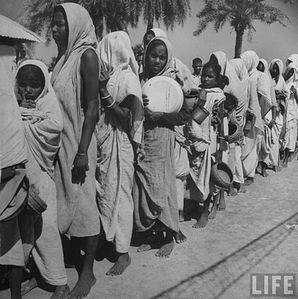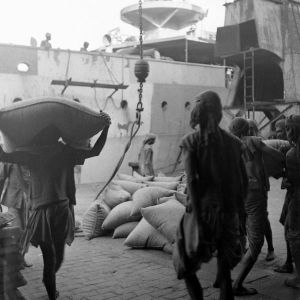1943The Bengal famine (তেতাল্লিশের মণ্বন্তর) and Mr Churchill...
World Hunger: Bengal in India
The Bengal famine of 1943
is one among several famines that occurred in British-administered Bengal. It is estimated that around 3 million Indians died from starvation and malnutrition during the period making the number of Indian deaths higher than the two world wars, the entire independence movement and the massive carnage that followed Partition of India.
http://en.wikipedia.org/wiki/Bengal_famine_of_1943
Some historians, social scientists, contemporary critics, and participants have identified British government inaction and adherence to utilitarian,
to mercantilist,
Mercantilism is an economic theory, thought to be a form of economic nationalism,[1] that holds that the prosperity of a nation is dependent upon its supply of capital, and that the global volume of international trade is "unchangeable". Economic assets (or capital) are represented by bullion (gold, silver, and trade value) held by the state, which is best increased through a positive and healthy balance of trade with other nations (exports minus imports).
The theory assumes that wealth and monetary assets are identical
and to Malthusian
xxxx
/Thomas Robert Malthus
The Reverend Thomas Robert Malthus FRS (13 February 1766 – 23 December 1834)was a British scholar, influential in political economy and demography.
Malthus popularised the economic theory of rent.
Malthus has become widely known for his theories concerning population and its increase or decrease in response to various factors.
- subsistence severely limits population-level
- when the means of subsistence increases, population increases
- population-pressures stimulate increases in productivity
- increases in productivity stimulate further population-growth
- because productivity increases cannot maintain the potential rate of population growth, population requires strong checks to keep parity with the carrying-capacity
- individual cost/benefit decisions regarding sex, work, and children determine the expansion or contraction of population and production
- checks will come into operation as population exceeds subsistence-level
- the nature of these checks will have significant effect on the larger sociocultural system—Malthus points specifically to misery, vice, and poverty
Malthusian social theory influenced Herbert Spencer's idea of the survival of the fittest, and the modern ecological-evolutionary social theory of Gerhard Lenski and Marvin Harris. Malthusian ideas have thus contributed to the canon of socioeconomic theory.
xxxx
policies as contributing factors to the severity of famine during the time India was under British rule.
For example, two of the worst famine-afflicted areas in the Madras Presidency, the districts of Ganjam and Vizagapatam, continued to export grains throughout the famine. : http://www.jstor.org/pss/2662775
These famines were typically followed by various infectious diseases such as bubonic plague and influenza, attacking and killing a population already weakened by starvation.[
*The Bengal famine of 1943 reached its peak between July and November of that year, and the worst of the famine was over by early 1945
Famine fatality statistics were unreliable, and a range of between 2–4 million has been suggested. Although one of the causes of the famine was the cutting off of the supply of rice to Bengal during the fall of Rangoon to the Japanese, this was only a fraction of the needs.
According to Cormac Ó Gráda, priority was given to military considerations, and the poor of Bengal were left unprovided for. Ó Gráda, Cormac (March 2007), "Making Famine History", Journal of Economic Literature Vol. XLV: 5–38
The Famine Commission of 1948 and Sen found that there was enough rice in Bengal to feed all of Bengal for most of 1943.
These studies, however, did not account for possible inaccuracies in estimates or the impact of fungal disease on the rice grains.]
De Waal states that the British government did not enforce the Famine Codes during the Bengal famine of 1943 because they failed to detect a food shortage.]
***The Bengal famine of 1943 was the last catastrophic famine in India, and it holds a special place in the historiography of famine due to Sen's classic work of 1981 titled "Poverty and Famines".[
Mike Davis has claimed that these famines were actually 'Late Victorian Holocausts' in the 1870s and 1890s.
http://www.open2.net/thingsweforgot/bengalfamine_programme.html
Severe food shortages were worsened by World War II, with the British administration of India exporting foods to Allied soldiers. http://en.wikipedia.org/wiki/Allied
The shortage of rice forced rice prices up, and wartime inflation compounded the problem.
Food deliveries from other parts of the country to Bengal were refused by the government in order to make food artificially scarce.
This was an especially cruel policy introduced in 1942 under the title "Rice Denial Scheme."
The purpose of it was, as mentioned earlier, to deny an efficient food supply to the Japanese after a possible invasion.
Simultaneously, the government authorised free merchants to purchase rice at any price and to sell it to the government for delivery into governmental food storage.
So, on one hand government was buying every grain of rice that was around and on the other hand, it was blocking grain from coming into Bengal from other regions of the country.
http://www.samarthbharat.com/bengalholocaust.htm
http://www.ias.ac.in/currsci/nov252004/1322.pdf
The price controls on wheat were introduced on December 1941, and on rice in 1942.
Amartya Sen has cast doubt on the idea that the rice shortage was due to a fall in production. He quotes official records for rice production in Bengal in the years leading up to 1943 as reported in the table to the right.
The 1943 yield, while low, was not in itself outside the normal spectrum of recorded variation, and other factors beyond simple crop failure may thus be invoked as a causal mechanism.
Churchill's role in The Bengal famine leaves his reputation in tatters!
Madhustree Mukerjee's book : CHURCHILL's Secret War reveals a side of Churchill largely ignored in the West and considerably tarnishes his heroic sheen !

***Interview :
http://bloggingheads.tv/diavlogs/31348
An other video about the famine here :
World Hunger: Bengal in India

Now you can not say that you did not know
A Bengali song :
World Hunger: Bengal in India
About his bengali song : """We who provide food for the whole world Why can't we eat can any one tell us? My wife has hanged herself She could no longer bear hunger, Now I plough deep into soil In the hope of seeing her again. We plough the fields Our bosom is always flayed But from the fields we get harvest None from the sacrred bosom. We shall plough no more for rice But to see how far it is to graves. Translated by: Hasna Jasim Uddin Moudud (Word and music by Jasim Uddin, record available at Calcutta (Kolkata) """


